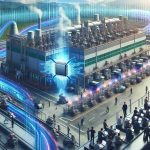In the rapidly evolving world of artificial intelligence, Nvidia has a bold new player on the scene: the Blackwell GPUs. While ChatGPT’s groundbreaking launch in late 2022 sparked an AI race among tech giants, it turns out the infrastructure wasn’t fully equipped for dedicated AI tasks. Nvidia’s upcoming Blackwell architecture, however, promises to change the game completely, being designed specifically for AI.
The Blackwell GPUs mark an ambitious leap for Nvidia, as they aim to equip tech companies with superior tools to advance their AI capabilities. Despite their impressive potential, these GPUs present challenges for today’s data centers. Many companies might need to overhaul their infrastructure entirely to utilize this cutting-edge technology effectively. Questions around adjustments, such as suitable liquid cooling systems and software compatibility, illustrate the complexity laid bare by these state-of-the-art processors.
Despite these hurdles, Nvidia’s dominant position in the market reassures investors and developers. The anticipated shift in tech infrastructure points to a future where advanced computing power becomes the norm, helping Nvidia overcome present supply chain complexities.
As the AI landscape broadens, the transition to Blackwell GPUs may well define which companies lead the way in technology innovation. Preparations for this grand transformation will likely drive significant investments, as businesses aim to capitalize on these trailblazing GPUs. Within a few quarters, when the initial teething problems get resolved, Nvidia is set to capitalize on a new era of AI advancement, potentially heralding a technological bull run.
Breaking Down the Future of AI: Nvidia’s Blackwell GPUs
In the dynamic world of artificial intelligence, Nvidia has introduced a disruptive force with their upcoming Blackwell GPUs. While the launch of ChatGPT in late 2022 ignited a fierce AI race, many systems weren’t ideally equipped for AI-specific tasks. Nvidia’s Blackwell architecture promises to fill this gap by being tailored explicitly for AI applications, marking a pivotal shift in computing technology.
Features of Blackwell GPUs
The Blackwell architecture signifies a substantial leap for Nvidia, focusing on optimizing AI performance. These GPUs are designed to offer superior computational power, energy efficiency, and scalability. One of the standout features is their tailored ability to handle AI workloads, setting them apart from traditional GPUs not optimized for such tasks.
Blackwell GPU Use Cases
These GPUs are set to empower sectors that heavily rely on AI, such as autonomous driving, healthcare diagnostics, and robotic automation. By providing improved processing capabilities, Blackwell GPUs could revolutionize how data is analyzed and utilized in real-time, paving the way for innovations across industries.
Challenges and Adjustments
Companies eager to adopt Blackwell GPUs might face significant hurdles, primarily related to infrastructure. The transition may necessitate comprehensive overhauls in current data centers, including the adoption of suitable liquid cooling systems and ensuring software compatibility, to optimize the use of these advanced processors.
Market Analysis and Predictions
Nvidia’s leading market position backs investor confidence, suggesting the company is well-equipped to navigate and potentially dominate the evolving AI landscape. This anticipated shift in technology infrastructure could redefine industry standards, encouraging further investments from businesses looking to stay at the forefront of innovation.
Pros and Cons of the Blackwell GPUs
Pros:
– Tailored for AI workloads, offering unmatched efficiency and performance.
– Potential to drive innovations in several critical industries by enabling advanced data analytics and automation.
Cons:
– Requires significant adjustments in existing IT infrastructure, potentially escalating initial costs.
– Companies might need to invest in additional resources for smooth integration, such as cooling solutions and compatible software.
Sustainability and Security Aspects
With sustainability becoming a critical concern, Nvidia is likely focusing on enhancing the energy efficiency of Blackwell GPUs, aiming to reduce the carbon footprint of AI computations. Security, another major concern in AI-driven environments, remains a priority, with these processors expected to feature robust security protocols to safeguard data.
Nvidia’s Blackwell GPUs are poised to set a new benchmark in AI computing, offering a blend of performance, efficiency, and innovation. As businesses adapt to these technological advancements, strategic investments and infrastructure enhancements will be crucial for capitalizing on the full capabilities of Blackwell GPUs and maintaining competitive edge in a technology-driven market. For more information about Nvidia and their product offerings, visit the Nvidia website.



















